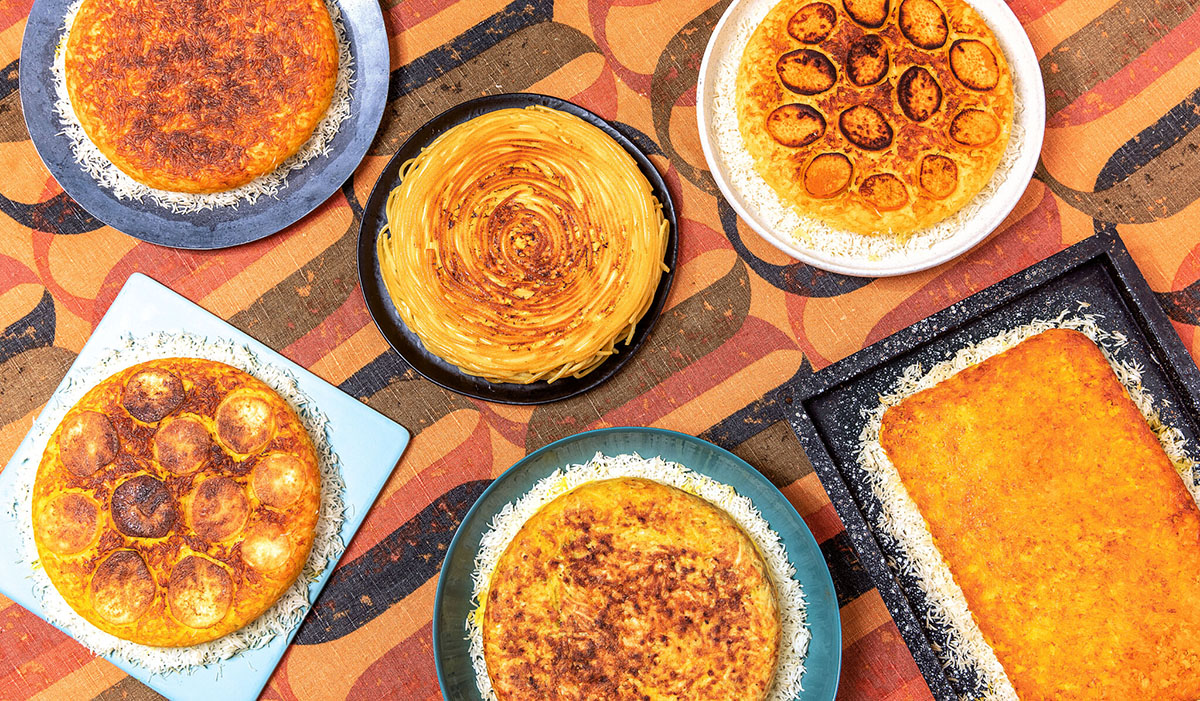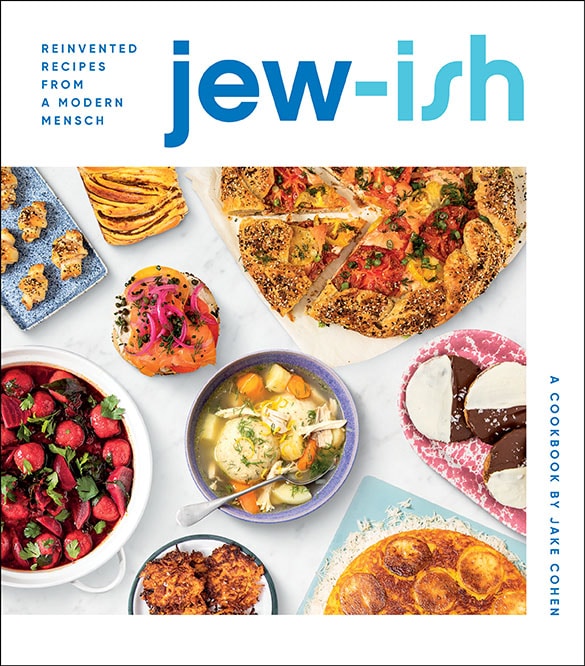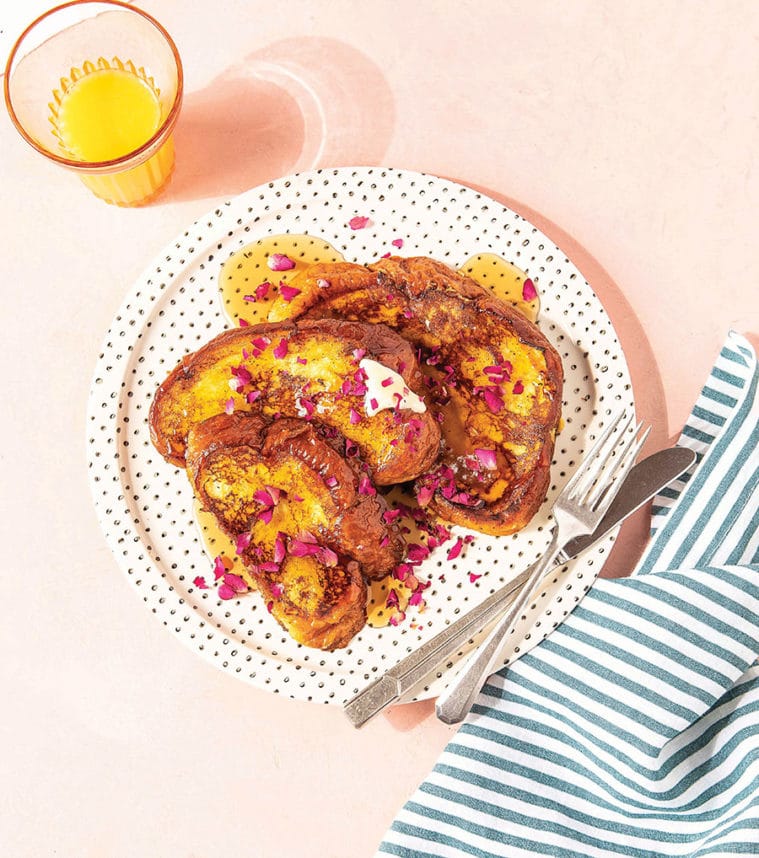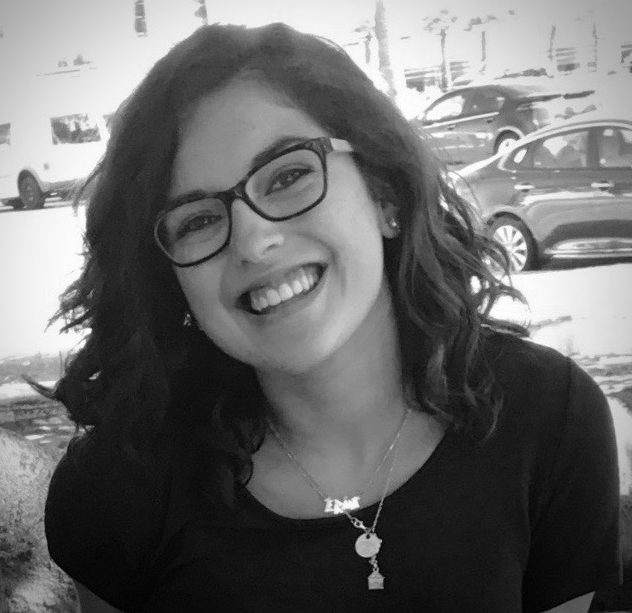 Photo by Matt Taylor-Gross
Photo by Matt Taylor-Gross Nice Jewish professional chef, Jake Cohen, always had a love for cooking. Rushing home every day as a teenager to watch “Barefoot Contessa,” the Ashkenazi foodie eventually took his hobby and turned it into a profession. He studied at the Culinary Institute of America, worked in test kitchens and restaurants around New York and eventually started contributing to dozens of food publications, including TastingTable.com, Time Out New York and The Feedfeed, where he is the editorial and test kitchen director.
Then Cohen met his Persian-Iraqi husband, Alex Shapiro, whose traditions, family stories and recipes flipped everything Cohen knew about Jewish cooking on its head.
“[Alex] had never heard of babka or gefilte fish,” Cohen said. “All of a sudden, I realized Jewish food cannot be defined by one section of a Jewish community… It completely shook up everything I knew about food in a secular sense. It made me reevaluate what that meant as a Jew struggling with identity. We began to explore that through Shabbat.”
Every Friday night, Cohen and Shapiro celebrated Shabbat by merging Persian and Ashkenazi traditions — all while sharing their journey on Instagram. Cohen introduced Ashkenazi delicacies to Shapiro and whipped up dishes he grew up eating that were new to Cohen’s palate. Cohen also started inviting friends over to his home for Shabbat dinners. Their home became a space that was conducive for modern Jewish ritual.
“It naturally became this queer love story all surrounding Jewish food, and that’s what excites me and that’s what I fell in love with,” Cohen said. The two have now been married for two years.
The couple’s weekly Shabbats led to Cohen creating his first cookbook. “Jew-ish: Reinvented Recipes From a Modern Mensch,” out everywhere on March 9, is part cookbook, part family memoir and part celebration of Jewish heritage and the differences in cooking techniques that make “Jewish food” broad and exciting.

In Cohen’s cookbook, you’ll find recipes for Cacio e Pepe Rugelach, Sabich Bagel Sandwiches, Latke Tahdigs, Buffalo Chicken Tahchin and Matzo Tiramisu. Within every recipe is a documented and preserved family history of the recipe’s origins. Cohen said that although “there’s nothing wrong with a recipe that comes out of my head — and some of those are my best recipes” — it’s the family recipes that have survived the Holocaust, religious persecution and relocation that resonate deeply with him.
One of the first recipes he ever wrote about was from his great-great-grandmother. “Nanny’s Apple Cake” recipe, which is featured in Food & Wine, Saveur and a headnote in “Jew-Ish,” went on a long journey before reaching Cohen on a scribbled down index card.
As the story goes, his nanny fled from Belgium to Cuba during the Holocaust, where she started baking the apple cake to celebrate Rosh Hashanah. From Cuba she moved to New York, where Cohen’s aunt makes her recipe to this day.
“I transformed it and wrote about it. To see people every year on Rosh Hashanah tag me [on social media] saying, ‘I’m making Jake’s Nanny’s Apple Cake,’ that is like magical,” Cohen said. “That is preservation of family recipes that will live on for generations. That’s the most important thing I can do. Preserve aspects of Jewish culture, my family’s culture and my husband’s family’s culture.”
Cohen also documented his husband’s family recipes by including their Kibbuh recipe, without any revisions, in the book. Since it was never officially written down, neither Shapiro nor his cousins know how to make it, and Cohen wanted to make sure those family recipes were passed down and remembered.
“It’s just something I wanted to do as an act of service for my husband and his family,” Cohen said about Kibbuh, a traditional Iraqi dish made with meat dumplings in a sweet-and-sour beet stew. “To offer a recipe for not only him but any young Iraqi Jew who remembers eating it growing up to now hav[ing it] as a jumping-off point to make it on their own — that is the most valuable thing I can do.”
Cohen said he gets emotional when reading the passages and head notes filled with family history on the pages of “Jew-ish.” Speaking to high school students on his press tour, he encouraged them to reach out to their grandparents and family members and ask them about the food they grew up with.

Noting he and other Millennials and Gen Z-ers have the privilege of being born in America after prior generations “fought so hard to create a more stable and more free life,” Cohen instructs that the easiest thing for younger Jews to do is ask “your grandmother what she ate on Shabbat. What did her mother cook? These are the things that add color into the family history.”
In documenting Jewish culture and history through recipes, Cohen hopes to continue honoring the Jewish idea of L’dor V’Dor (from generation to generation) through food.
“Jew-Ish” features dozens of recipes, holiday menu cards for Rosh Hashanah, Break Fast, Hanukkah and Passover, and a personalized Haggadah for those who pre-order by March 8.
Cohen adds, it’s a “full acceptance of Jewish identity, but in a way that works for you.” A core value of the book is Jewish hospitality, where anyone can create a space to break bread with friends, family, loved ones and strangers. Cohen, who is also a board member for Shabbat-hosting organization One Table, said every recipe included in the book was tested at a Shabbat dinner with at least 10 guests. Although the pandemic has halted large gatherings, the spirit of Jewish cooking can continue in any home all the time.
With Valentine’s Day coming up on Sunday, Feb. 14, Cohen noted that a great way to celebrate your special someone with a Jewish spin is by making his Rose Water and Cardamom French Toast featured in “Jew-Ish.” (Full recipe at the end of the article.) Challah french toast is the perfect Valentine’s Day brunch since many Jewish families will already have leftover challah from Shabbat. The classic challah Trench toast recipe gets a modern twist by infusing rose water and cardamom into the challah soaking batter.
“As I started cooking a lot of my husband’s family’s recipes, I really fell in love with adding rose water and cardamom to everything,” Cohen said. “It becomes this really decadent floral sweet breakfast. The idea of doing breakfast or brunch as an act of starting the day as a couple is so sweet.”
What started as a love story between food and culinary arts for Cohen turned into preserving Jewish history while making room for new traditions that fit modern Jewish lifestyles. As soon as Cohen found connection and meaning in Shabbat, he said it extended to every Jewish ritual thereafter. He hopes others can find the why behind the Jewish rituals and traditions in this cookbook, like he was able to when creating it.
“My modern Jewish family is a blend of a young queer couple, one Ashkenazi, one Mizrahi, and the way we cook is inspired by both,” Cohen said. “My hope is as you read it, even if you aren’t as familiar with the ingredients, you’ll be familiar with the stories and the passion.”
“Jew-ish: Reinvented Recipes From a Modern Mensch” is available for pre-order until March 8. The book is available everywhere books are sold. Follow Jake Cohen on Instagram and TikTok.

Rose Water and Cardamom French Toast
Yield: Serves 6 to 8
Prep Time: 15 minutes, plus 1 hour soaking time
Cook Time: 20 minutes
It’s Shabbat tradition to always have two challahs on the table. While the real reason is to represent abundance, I like to say its purpose is to have one left over for French toast the next morning. Funny story: Alex stood me up on our second date, for which I had prepared a brunch spread including a huge platter of challah French toast that I proceeded to eat alone on my couch in disappointment. Love wins!
Naturally, you already know that it all worked out for us, and French toast has become an integral part of our relationship. Over the years, I’ve tried to switch it up past the expected flavorings of vanilla and cinnamon. Instead, I go the Middle Eastern route, adding floral rose water and warm cardamom to the mix. (For those of you who love rose water as much as we do, try spiking your maple syrup with a splash for an extra kick of floral sweetness.)
Now, the secret to achieving the custardy French toast of your dreams is making sure the bread soaks long enough. You want each piece to be completely saturated in the egg mixture before slowly frying them in butter to fully cook the centers. All that’s left is to platter them up and pray your breakfast guest(s) arrive. If not, you’ve luckily discovered the beauty of meal planning and now will be enjoying this recipe every morning for the rest of the week!
3 cups whole milk
½ cup sugar
1½ tablespoons rose water
1 teaspoon kosher salt
¾ teaspoon ground cardamom
6 large eggs
1 (16-ounce) loaf challah bread (see page xvii), sliced 1 inch thick
6 tablespoons (¾ stick) unsalted butter
Dried food-grade rose petals, for garnish (optional)
Maple syrup, for serving
- In a large bowl, whisk together the milk, sugar, rose water, salt, cardamom, and eggs until smooth.
- Arrange the challah slices over the bottom of a large baking dish, shingling them to fit, then pour over the milk mixture. Cover with plastic wrap and refrigerate for 1 hour to soak.
- In a large nonstick skillet, melt 1 tablespoon of the butter over medium heat. Add about 3 slices of the soaked challah to the pan and cook until golden, 2 to 3 minutes. Flip the challah, add another tablespoon of the butter to the pan, and cook until golden and cooked through, 2 minutes more. Transfer the French toast to a platter. Repeat to cook the remain-ing soaked challah slices, working in two batches and using the remaining butter.
- Garnish the French toast with a pinch of dried rose petals, if desired, then serve immediately with maple syrup.
Excerpted from JEW-ISH: A COOKBOOK: Reinvented Recipes from a Modern Mensch © 2021 by Jake Cohen. Photography © 2021 by Matt Taylor-Gross. Reproduced by permission of Houghton Mifflin Harcourt. All rights reserved.





















 More news and opinions than at a Shabbat dinner, right in your inbox.
More news and opinions than at a Shabbat dinner, right in your inbox.